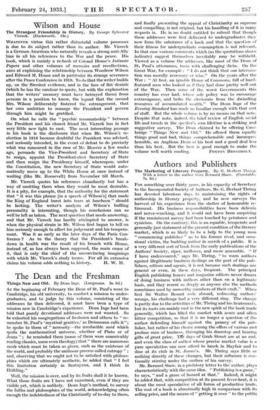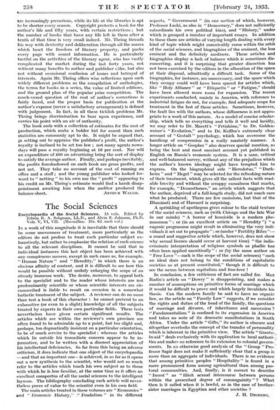Authors and Publishers
FOR something over thirty years, in his capacity of Secretary to the Incorporated Society of Authors, Mr. G. Herbert Thring has devoted laborious days to maintaining the rights of authorship in literary property, and he now surveys the harvest of his experience from the shelter of honourable re- tirement. His business responsibilities have been delicate and nerve-wracking, and it would not have been surprising if the reminiscent survey had been touched by petulance and cynicism. On the contrary, this is an equable, temperate and generally just statement of the present condition of the literary market, which is as likely to be a help to the young man " commencing publisher " as to his former rival, and occa- sional victim, the budding author in search of a public. It is a very different sort of book from the early publications of the Authors' Society, riper, mellower, and more amenable. " If I have endeavoured," says Mr. lining, " to warn authors against illegitimate business dealings on the part of the pub- lishers, editors and agents, it is not because such dealings are general or even, in these days, frequent. The principal English publishing houses and magazine editors never dream- of doing business with authors other than on a legitimate basis, and they resent as deeply as anyone else the methods sometimes used by unworthy members of their craft." When first Sir Walter Besant rode abroad, redressing authors' wrongs, his challenge had a very different ring. The change is partly due to the activities of Mr. Thring and his lieutenants, but its roots are mainly cast in the new spirit of the book trade generally, which has filled the market with acute and often bitter competition, so that it is no longer a question of the author defending himself against the penury of the pub- lisher, but rather of his choice among the offers of various and profuse men of business, thronging his doorstep and bearing gifts of great price. Tffe days of Grub Street are at an end, and even the class of author whose precise market value is a pure speculation can now afford to lunch in Mayfair and to dine at its club in St. James's. Mr. Thring says little or nothing directly of these changes, but their influence is con- tinually stirring under the surface of his survey.
Mr. Bernard Shaw, in a prefatory letter to the author, plays characteristically with the same idea. " Publishing is a game," he says, " and a game of hazard at that." Indeed, it might be added that, with competition at its present fever-heat, it is about the most speculative of all forms of productive trade. The cost of a book is abnormally high in comparison with its selling price, and the means of " getting it over " to the public
are increasingly precarious, while its life at the libraries is apt to be shorter every season. Copyright protects a book for the author's life and fifty years, with certain restrictions ; but the number of books that have any life left in them after a tenth of that time is very small indeed. Mr. Thring threads his way with dexterity and deliberation through all the mazes which beset the freedom of literary property, and packs every page with sound information. He is particularly tactful on the activities of the literary agent, who has vastly complicated the market during the last forty years, not without many benefits to author and publisher alike, but also not without occasional confusion of issues and betrayal of interests. Again Mr. Thring offers wise reflections upon such widely different problems as the compilation of anthologies, the terms for books in a series, the value of limited editions, and the ground plan of the popular prize competition. The much-vexed question of the cost of author's corrections is fairly faced, and the proper basis for publication at the author's expense (never a satisfactory arrangement) is defined with judgement. In fact, in all these ticklish problems Mr. Thring brings discrimination to bear upon experience, and carries his point with an air of authority.
The book ends with a collection of estimates for the cost of production, which make a bolder bid for assent than such statistics are commonly apt to do. It might be argued that, in setting out to appraise the publisher's profit, the author's royalty is inclined to be set too low ; not many agents nowa- days will pass a royalty beginning at 10 per cent. Nor will an expenditure of £60 on advertising bring the sort of display to satisfy the average author. Finally, and perhaps inevitably, the profits foreshadowed on each book are gross profits, and not net. They take no account of the cost of running an office and a staff ; and the young publisher who looked for- ward to " netting " to his own use the " profit " appearing to Ins' credit on Mr. Thring's estimate would find a harsh disap- pointment awaiting him when the auditor produced the







































 Previous page
Previous page